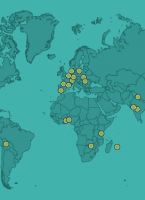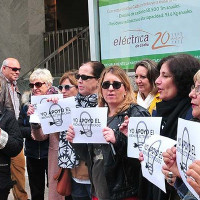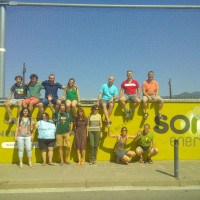Alliance against Energy Poverty, Cataluña Standing up to human rights abuses by energy corporations through advocacy and mutual support
Topics
In Spain, energy poverty is a very real and punitive phenomenon, affecting around 5.1 million people or some 11% of the total population.
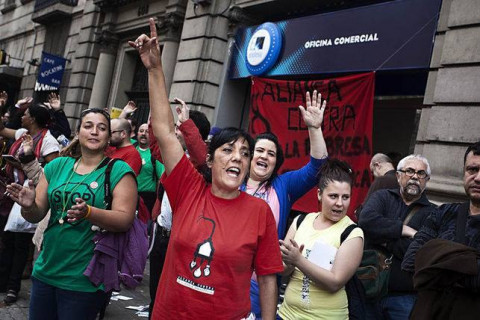
In recent years, the Alliance against Energy Poverty (Alianza contra la Pobreza Energética - APE) has brought about a paradigm shift in Cataluña by bringing this issue to public attention. This alliance of energy poverty-affected people, social movements, local residents and NGOs is showing for the first time that energy poverty is much more than a question of whether or not families can afford to heat their homes. For APE, access to basic supplies such as energy and water is a fundamental human right.
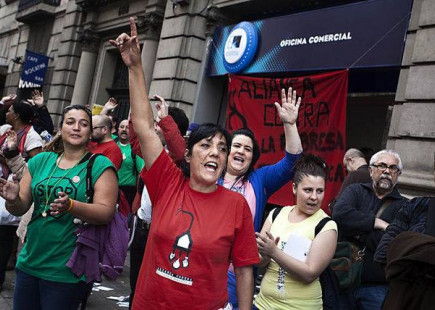
Affected population 7.523 million.
The alliance is responsible for co-organising a People’s Legislative Initiative, and the ensuing enactment of one of the most effective laws in the EU in protecting vulnerable people against energy poverty in 2015. Despite this law, some people who are unable to pay their bills were illegally disconnected from the energy supply in the first months in which the law was adopted. In 2016, the public reaction to this unjust situation was ignited by the tragic death of 81-year-old Rosa from the city of Reus, who died in a fire caused by a candle she was using to light her home after Gas Natural Fenosa had cut off her electricity.
APE has developed into a mutual support network that accompanies affected people, and an important channel for political education and change.Through the development of a lengthy and collective empowerment process, APE facilitates people’s transformation from victims of the abuses committed by energy companies to citizens demanding justice. A media strategy focusing on the political context has helped the public to make the link between energy poverty and injustice, and to become critical of the unfair distribution of wealth. Energy companies are becoming uncomfortable due to the increasing public awareness and pressure, and the challenge is now to ensure that they abide by the law and write off illegal debts.
Social movements and civil society join forces
Until about 2014, no one talked about energy poverty in Spain. Although families had long been struggling with continuously increasing energy prices, the concept of energy poverty was unknown and protests and movements around the issue were non-existent. In February 2014, with the economic and financial crisis in its death throes but still hitting the most vulnerable the hardest, a group of affected locals, community organisations and citizen platforms came together to set up the Alliance against Energy Poverty. The aim of the alliance was to fundamentally replace the current inhumane situation with a new, integrated approach.
At the time, movements calling for the right to decent housing were observing an increasing number of cases where mortgage difficulties had become a secondary issue and the most pressing problem was an unreliable or non-existent energy supply. At the same time, criticism of the energy oligopoly coming from the green movement and organisations campaigning for energy democracy was not sufficiently filtering through to the general public. As a result of this urgent situation, the housing and green movements – as well as the civil society organisations working on socio-environmental justice in the Global South – joined forces. Together they shaped a common narrative that approached the right to basic supplies, such as water and energy, as part and parcel of the right to adequate housing.
This led to the creation of the Alliance against Energy Poverty in February 2014, and an integrated discourse and tactics followed. The target was the various corporate abuses – including the disconnection of the water and electricity of vulnerable consumers, telephone harassment in connection with debts, and predatory pricing practices – that have been imposed not only in Spain, but also in the Global South. The alliance demanded that the actors who had been granted the privilege of managing basic supplies be obliged to meet people’s needs. This approach has shaken energy corporations and political decision makers to the core, and placed the critical issue of energy poverty on the political agenda.
Right to energy
The Alliance against Energy Poverty fights for universal access to energy as a human right, and one that should be guaranteed regardless of income level or material conditions. This right is particularly crucial for families in vulnerable and insecure situations. Key to APE’s approach is that people affected by the unjust energy model are viewed not as victims but as potentially active political subjects who can claim their rights. As part of the alliance’s lengthy and collective empowerment process, people have been transformed from sufferers of the abuses committed by large oligopolistic corporations to citizens determining the red lines that corporations must not be allowed to cross.
Energy poverty in numbers
According to the 2016 report on energy poverty by the Spanish Environmental Science Agency (ACA), about 11% of Spanish households – around 5.1 million people – are unable to keep their homes sufficiently heated in the winter. This is well over the European average of 10.2%, and the number increased by another 22% over the past two years since the publication of the report. In addition to the 11% who are unable to heat their homes, as many as 21% of Spanish families are living in situations associated with energy poverty (falling behind with bills, heating their homes insufficiently, spending a large percentage of total income on energy bills, etc.) In Cataluña, 18.7% of the population spends more than 10% of their disposable income on home energy bills, 11.1% have fallen behind on bills, and 8.7% are unable to adequately heat their homes.
How electricity ceased being a public service
The legal framework that governs the energy business in Spain – and the law that in theory should establish protection for vulnerable consumers – is Law 24/2013 on the electricity sector. In practice, this law describes energy as a “service in the general economic interest” and has served to further deregulate the electricity market. With electricity supply no longer considered a public service, the implication is that protecting the free market is the ultimate priority. As the oligopoly still enjoys the privilege of managing these services, thereby making vast profits and effectively controlling the market, these incumbent corporations ought to bear the cost of the energy poverty that results from their management model. However, most local governments in Spain see energy poverty as a problem of household income, with the solution being the payment of bills by social services to prevent disconnection from the electricity supply. In fact, this strategy only prolongs the nightmare, as the bills start mounting up again the following month.
APE’s response to this conundrum is that energy should enable people to lead dignified lives, and that a basic, essential supply of energy should serve this purpose rather than being a source of profit. The alliance’s campaign brings together energy poverty-affected people, social movements like the platform of people with mortgage problems (Plataforma de Afectados por la Hipoteca – PAH), local residents and consumers groups, and civil society organisations with international connections. This amalgam of actors has managed to alarm the energy companies and produce a sea change in public opinion.
The death in November 2016 of 81-year-old Rosa from Reus, a small city next to Barcelona, added fuel to the fire. Rosa tragically died in a blaze caused by a candle she was using to light her home after Gas Natural Fenosa had cut off her electricity a few months earlier. Gas Natural Fenosa had failed to notify social services before cutting off the power supply, thus infringing Law 24/2015 as approved by the Catalan Parliament. Although the company never publicly acknowledged its responsibility for Rosa’s death, it was fined € 500,000 by the Catalan Government.[1]
No more energy cuts
More than a year before Rosa’s unfortunate death, the Catalan Parliament had unanimously approved Law 24/2015 on the housing emergency and energy poverty. This law is among the most effective in the EU in providing vulnerable people protection against energy poverty.[2] It was the result of a People’s Legislative Initiative (Iniciativa Legislativa Popular – ILP) put forward by APE, PAH and the Economic, Social and Cultural Rights Observatory (Observatorio de los Derechos Económicos, Sociales y Culturales – ODESC). This initiative was developed with the first-hand knowledge that these organisations and social movements had received from directly affected people. The draft law laid out the urgent needs as shown by people’s day-to-day experiences, with the help of legal experts who were also members of these organisations. The content and strategy were shared with the grassroots members of the platforms and social movements. While signatures were being collected, advocacy work was done with political parties and meetings were held with their legal teams to negotiate technical issues and legal terminology.
As a result, for the first time ever in Spain, a law forbade the practice of cutting off the electricity of vulnerable families. This was achieved through the introduction of the so-called precautionary principle: before cutting off supply, utility companies must first contact social services in order to verify whether or not the customer is energy vulnerable.
The case of Rosa brought to light the fact that companies had been trying to dodge the law and delay its enforcement for more than a year. Following her death, citizens took to the streets to demand that the companies be held responsible, and called on local governments to be courageous in enforcing Law 24/2015.
Giving voice to the energy poor
APE has shown that a better situation can be envisioned and created with new campaigning tools and lobbying strategies. Demands that were just a few months ago unthinkable have been transformed into achievable goals. Progress has been made in breaking the link between guaranteed access to energy and water and the ability to afford it. Above all, the alliance’s main achievement is the fact that the vision to eradicate energy poverty has become part of public opinion.
The relationship with the media has also been key, and APE’s actions and statements have received widespread press coverage. The close relation of the alliance’s demands with the fragility of life sometimes attracts sensationalist coverage: a striking photo of a person in a situation of energy poverty, for example. APE has managed to avoid the dramatisation and simplification of the issue by stipulating the inclusion of two perspectives in all media coverage: not only the voice of the affected person but also the political message. This reflects the context of the in-depth work of the alliance in addressing the situation of affected people, and ensures that the press does not simply relegate them to victim status.
In practice, APE has introduced a human rights perspective into the free market approach to basic services. Energy corporations are held responsible for the situation of vulnerability that the current system imposes on people.[3] APE also proposes that these rights should be guaranteed as a package, for example by including water in the basic guaranteed services. This is unprecedented in the EU, as other countries deal with water and energy separately.
Collective action to transform poverty and vulnerability
The empowerment and political education of each person participating in APE is the result of a vast store of collective knowledge, in which everyone is the protagonist in their own situation. Thus, the tortuous procedures that each affected person has had to endure – for example in order to obtain electricity in their homes or deal with debt collection – have been used as learnings for the group. APE’s experience shows the potential for collective action in transforming individual situations of poverty and vulnerability. Thanks to its networks of solidarity and citizen resistance among affected people, it has been possible to re-politicise the mitigation of energy poverty. This has been done by breaking down the barriers that previously restricted political debate around the problem of discontinued services, relegating it to a mere technical issue.[4]
Alongside this important media work, APE has engaged in advocacy with different players including local governments and the Catalan Government throughout the process. This has been crucial in the building of a common front that not only demands accountability from the private companies that currently manage these services, but also takes practical public action in the form of citizen oversight and vigilance.
Following APE’s inception, energy and water problems that the media and politicians previously explained as a matter of lack of finances (requiring bills to be paid by social services) or a lack of energy efficiency (necessitating technical fixes) are now understood as instances of injustice and inequality. Public opinion has started linking energy poverty to injustice, and has become critical of the unfair distribution of wealth. It is once again becoming commonsensical that energy and water should be protected – not to enrich a handful of companies – but in order to enable people to live decent lives.
Progress is significant. The strategy has made the large energy corporations very uncomfortable, and the problem has been brought to light through the massive amount of media coverage. Previous proposals by civil society or local government –which focused on providing assistance to families and were softer on the corporations – never managed to produce as much of an impact. As a result of APE’s campaign, and particularly following the death of Rosa from Reus, the corporations’ images are now seriously tarnished.
Challenges
The upcoming challenges facing APE are related to the need to intensify the enforcement of Law 24/2015, two and a half years after it was enacted. Although the basic power supply of vulnerable people is now guaranteed and they are protected from being disconnected, they are still accumulating debts, some of which amount to more than € 2000. Although public opinion is clear that local government should not have to pay these debts, energy companies are shunning their responsibilities, and even refusing to write off part of the debts.
APE believes that it should be possible to require the forgiveness of the energy debts in order to give vulnerable families a second chance. To this end, APE recommends continuous pressure on the energy corporations (with each family sending regular or even weekly requests that their debt be written off) as well as on local governments (reminding them that these negotiations are also their responsibility). At the same time, the message that these debts are illegitimate, unjust and exorbitant must be continuously repeated in order to change public opinion.
In short, the guarantee of basic services should also offer people the opportunity to start again. Protecting families when they are in a vulnerable situation and then abandoning them to their fate when they have employment and can pay new bills but not the older ones makes no sense. The fight for the right to energy in Cataluña and in Spain, is developing rapidly. New ways of campaigning also require us to collectively envision new ways of building more dignified lives.
Resources
ACA (2016), “Pobreza, vulnerabilidad y desigualdad energética. Nuevos enfoques de análisis.” Available at: https://www.cienciasambientales.org.es/index.php/comunicacion/noticias/567-3er-estudio-pobreza-energetica-en-espana-nuevos-enfoques-de-analisis
Bouzarovski, S., Tirado-Herrero, S., & Petrova, S. (2015), Energy Vulnerability: Trends and Patterns in Europe (Policy Briefing No. 1), Manchester: EVALUATE Project, Manchester.
Guiteras, M. (2016), “Pobresa energètica i models de gestió de l’aigua i l’energia a la UE. Cap a la garantia universal del dret als subministraments bàsics”, ESFeres (Enginyeria Sense Fronteres). Available at: http://esf-cat.org/wp-content/uploads/2017/01/ESFeres16-PobresaEnergeticaiModelsdeGestio.pdf
Walker, G. (2016), The Right to Energy: Meaning, Specification and the Politics of Definition, L’Europe en Formation, (n. 378), pp. 26-38.
Endnotes
[1] http://www.bbc.com/news/world-europe-38024374
[2] As an example, it is worth pointing out that Directives 2009/72/CE and 2009/73/CE have required EU Member States to enshrine protection for vulnerable energy consumers in their national laws since 2009. Countries including Spain had still however not done so by 2017. The changes introduced in Spain’s law (with the reform of the so-called “social tariff,” a lower tariff specifically for vulnerable families) to provide protection to vulnerable consumers are wholly insufficient. They fail to solve the problem of electricity being cut off, and make local governments responsible for paying the bills. Cataluña’s Law 24/2015 thus continues to offer the best protection for the most vulnerable people.
[3] Law 24/2015 provides for cooperation agreements to be signed between local governments and energy corporations, obliging them to offer very significant discounts or assistance to families who have not been cut off in paying their debts, at the corporations’ expense. The corporations’ refusal to take responsibility has meant that no such agreements have as of yet been signed. Therefore, although vulnerable families are no longer being cut off, the question of what happens to their debts currently remains in limbo.
[4] Tirado and Bouzarovski, 2015.
